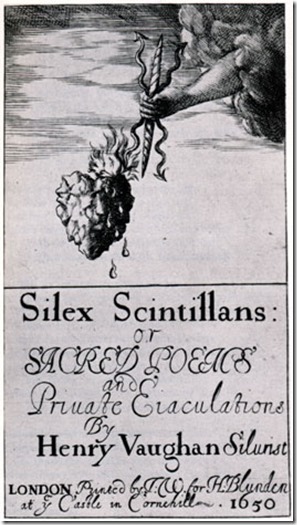A dense occurrence of American political events has not quite stopped my reading of poetry and creation of music to combine with it, though there were hours this week when I could not help but wonder and rage at the sachems and attendents readings of the body politic and it’s befuddled head man.
Luckily, on days like these, one can reach into the corpus of poetry, and within little time find something someone wrote years ago that rings with the current day, like an old bell calling us for a current ceremony.
And it’s so that I came upon this poem written around 1650 by Welsh poet, physician, and mystic Henry Vaughn. It was written during the aftermath of the British Civil War (Vaughn’s family was on the Royalist/Anglican side, which had lost). When Vaughn writes of affliction, it’s from an intimate and substantial experience. Biographers tell us he was recently widowed, his family disinherited, his religion suppressed, and that he may have been suffering from some kind of illness as well. And of course, his country was broken, in ways that civil war and its divides make manifest.
This makes “Affliction” an unusual poem, because it revels in this level of distress, makes of it a necessary part of his and his country’s spiritual maturation. Read with some attention to what I believe is Vaughn’s passion, I can compare it to the hymn “As an Eagle Stirreth in Her Nest” based on a text from Deuteronomy chapter 32, “The Song of Moses,” a text and hymn that have inspired many sermons given in Afro-American Christian churches, which also know, oh yes, something of affliction.*
Vaughn doesn’t use the Deuteronomy text, but he gets in his own licks here: “Crosses are but curbs/To check the mule, unruly man” for example. And “Kingdoms too have their physic, and for steel/Exchange their peace and furs.**”
The Latin title of the book where this poem first appeared means “The Fiery Flint,” and the engraving shows the image it’s to portray: fire sparked from a heart of stone. And you in the back row who’ve just read the subtitle: stop snickering and read the later definition in the dictionary: “A short, sudden emotional utterance.”
Henry Vaughn has never been a big deal in English literature. Much of what I read checking on him goes on at length about Vaughn being Oasis to George Herbert’s Beatles. He gained a little given the interest on the Metaphysical poets engendered by the New Criticism guys like T. S. Eliot in the 20th century. One fan, who I wouldn’t have suspected: famed SF writer Phillip K. Dick.
Given the amount of time I wasted this week following our modern afflictions, I rushed this piece a bit, using a simple and repetitive bass and drum part I set up quickly,*** a “let’s give it a go” recording of the vocal, and a “live” one-pass guitar part: “Like strings stretch ev’ry part/Making the whole most musical” said Vaughn.
The text of “Affliction” is here if you’d like to read along, and my performance of it is available with the player below. Will listening to it help one wax metaphysical within our current struggles? Felt good to me to do this one anyway.
*One preacher who famously delivered variations on this text was Aretha Franklin’s father, the Rev. C. L. Franklin, who had a popular recorded version on Chess Records in 1953, which would make him a label-mate of Harmonica Frank from last time. Please don’t be disappointed if I don’t rise to Franklin’s level of transfixing declamation here.
** Physic is used as a medical metaphor in the poem, and of course, Vaughn later practiced as a physician. In the medical theories of the day, a cathartic drug, a physic, was often used to rebalance or reboot the humours of an ill human. Steel here stands for armor and swords, that is: warfare.
